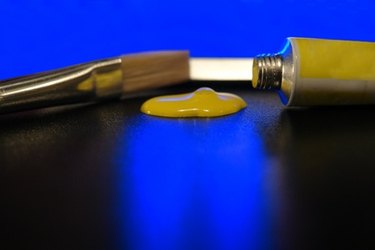Things You'll Need
Bowl
Plastic ties
Clear plastic sandwich bag
Water

Over the years painters have come up with many methods for storing their leftover paint, or paint-soaked brushes. Though a relatively new and obscure practice among painters, freezing acrylic paint is a simple way to store a brush full of paint. Since most paints are very expensive, no painter wants to waste his or her paint at all. Acrylic paint is able to be frozen for later use, because today's acrylic paint goes through a repetitive freeze-thaw process before its released to the market. Thawing frozen acrylic paint should be done slowly, to ensure that the paint retains its original composition.
Step 1
Take your frozen paint brush out of the freezer, and place it in a plastic bag. A small, clear plastic sandwich bag is ideal for this process.
Video of the Day
Step 2
Wrap the bag around the paintbrush and tie it, or use a plastic tie to tie it onto the brush handle, leaving the brush tip in the bag, and the handle exposed.
Step 3
Set the bag in a bowl, and place the bowl in a sink. This will reduce any mess that you might make as the paint thaws, and keep the paint in one contained area.
Step 4
Fill the bowl with a little warm water, then set a rock or other weighted object onto the bag to keep it from floating around. This will help to thaw out the paint faster, and won't damage the paints physical properties.
Step 5
Check the bag in about two hours to see if the paint has thawed. Depending on how much paint was frozen, the time may be a bit longer, or a bit less. Typically, a teaspoon size amount of frozen acrylic paint should take no more than three hours to completely thaw out and be useable.
Warning
Do not use hot water or a microwave to thaw out the paint. This will ruin the paint, and could damage a microwave.
Video of the Day